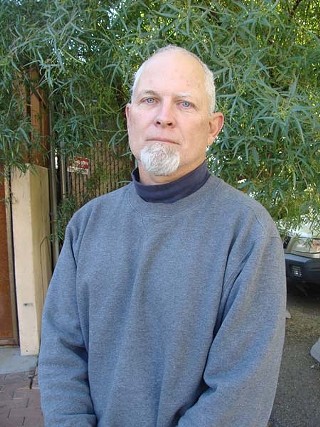Although it's been almost two years since the Pima County Board of Supervisors voted to stop insuring pre-Medicare-age retirees, Mike Humphrey still hopes the county will reconsider.
When Humphrey and fellow retiree Linda Trozzi discovered the county was forming a health-insurance committee, they invited themselves to the table in December, hoping their presence would get the committee to re-examine why 670 retirees lost their benefits in 2010. (See "Health Matters," March 17, 2011.)
"We were hoping that after two years, the county would be willing to finally look at health insurance differently," Humphrey said.
But after the most-recent monthly health-insurance committee meeting, on Tuesday, Feb. 28, Humphrey told the Tucson Weekly that he was amazed to discover that Pima County would not be issuing a request for proposals from other companies, and instead would keep the current plan with UnitedHealthcare.
"Here we were, thinking that the county would have an opportunity to look at alternative plans, but no—all along, the county has been planning to continue with UnitedHealthcare," he said.
Still, Humphrey was encouraged by a discussion about returning the health-insurance benefit to pre-Medicare-age retirees. An attempt was made to dismiss the proposal, but Humphrey said representatives from the Service Employees International Union requested that the county crunch the numbers and present cost estimates at the next meeting, on March 27.
Maya Castillo, president of the Pima County SEIU chapter, confirmed that the organization asked the county for a review.
"It wasn't right to vote to not put (early retirees) back on the health insurance when we didn't know enough to make an educated decision," Castillo said.
While the support from SEIU is heartening, Humphrey said he and other retirees were disappointed in 2010 when the insurance benefit ended, and the union didn't speak up for retired union members.
Castillo said she understands why they were disappointed, but said that back then, everyone regretted the county's decision.
"UnitedHealthcare really had us over a barrel," she said. The insurer's stance was: "Get rid of these retirees, or your health insurance is going to go up," Castillo said. "It was a painful decision for the board, and it was really painful for current employees, and is still a sore spot."
That original vote was 3-2, with Republicans Ray Carroll and Ann Day voting against cutting out retirees. Humphrey and others started the Pima County Retirees Association (www.pimacountyretirees.org) and reached out to affected retirees to pressure the Democratic supervisors who voted to eliminate their county insurance—Richard Elías, Sharon Bronson and Ramón Valadez—but to no avail.
County Administrator Chuck Huckelberry said it was a necessary cost-cutting measure to keep insurance affordable for the county's current employees, and that offering those retirees insurance through the plan sponsored by the Arizona State Retirement System gave them comparable coverage. Retirees countered that the county had a budget surplus at the time, and that going to the state insurance plan increased retiree out-of-pocket costs from the existing $112 per month to more than $900 for some retirees.
Huckelberry was not available for comment by the Weekly's press time.
Allyn Bulzomi, director of the county's human resources department, requested that questions be emailed to him. In response to our questions about the decision to stay with UnitedHealthcare, Bulzomi wrote: The (health-insurance committee) is an advisory committee to the county administrator. The committee took action, based on staff's recommendation to the committee, to recommend to the county administrator to renew with UHC. ... During the spring of 2011, the county conducted a limited procurement solicitation. Based on this process, the decision was made to continue with UHC.
Bulzomi referred to an April 12, 2011, memo from Huckelberry reporting that the solicitation process asked other insurance carriers to match the county's current plan, but "the resulting actual costs were not significantly reduced as we had hoped."
Last year, retirees charged that the county was using questionable data to claim that retirees were pushing up costs. Research by Trozzi showed a list of 30 claimants, with only one retiree involved in the five most-expensive claims in 2009 and 2010.
But in May 2011, Huckelberry told the Weekly that "the highest-cost claims are not the measure of retiree cost. It is total claims paid versus total premiums paid. The data, in all cases, indicates the total claims paid for retirees are almost twice those of regular employees."
Trozzi is still waiting to receive information on retiree health-care costs through a public-records request she filed last year. She said that figures comparing retiree costs to the costs of current employees have never been produced, and are needed to have "an honest discussion on health care for Pima County employees."
Castillo said that making these decisions about health care continues to put everyone involved in between "a rock and hard place. What we're being told is if we add (retirees), current employees will have to pay significantly more. As the elected president (of SEIU), I am authorized to speak on behalf of those current employees. I can't have that happen.
"On the other hand, I have been working for the Pima County Public Library for 14 years. What am I going to do when I am ready to retire? ... Should I have to wait to do 50 years of service before I can retire?"
Bulzomi said that decisions about the county's request-for-proposal process for health-insurance coverage would have to be made by the Board of Supervisors. However, Castillo said she understood that a decision was already made before the health-insurance committee began meeting in December.
"I tend to think, and tend to hope, that this is the last year of this contract. This is me being optimistic that the county is investigating and looking at possible self-insurance in future years. I asked way back in December for those costs. It's disappointing we can't see other ways to go and check into all options," Castillo said.
Castillo, who has three dependents on her insurance plan, said she would like to see options different from the insurance she currently carries, which has a $4,000 deductible.
"Because I'm working, and I have a great job, and my husband is working, we're both really lucky," Castillo said. "There are others who are in much-worse situations. In the meantime, the reality is that we're just barely middle-class."





![[Update]: Decision on The Bike Ranch May Be Tabled to Tuesday, July 2](https://media2.fdncms.com/tucsonweekly/imager/update-decision-on-the-bike-ranch-may-be-tabled-to-tuesday-july-2/u/r-bigsquare/25080369/bigstock-an-unidentified-biker-heads-up-234325444.jpg?cb=1606949017)








